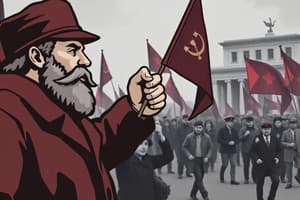Podcast
Questions and Answers
What happens when the material forces of production come into conflict with the existing relations of production?
What happens when the material forces of production come into conflict with the existing relations of production?
- A period of social revolution begins (correct)
- A period of stability is established
- New relations of production immediately appear
- Economic conditions remain unchanged
The consciousness of a period of transformation can be judged solely by its own perspectives.
The consciousness of a period of transformation can be judged solely by its own perspectives.
False (B)
What are the epochs in the progress of the economic formation of society?
What are the epochs in the progress of the economic formation of society?
Asiatic, ancient, feudal, and modern bourgeois methods of production.
No social order ever disappears before all the productive forces for which there is room in it have been ______.
No social order ever disappears before all the productive forces for which there is room in it have been ______.
Which statement best describes the bourgeois relations of production?
Which statement best describes the bourgeois relations of production?
The Industrial Revolution began in ______.
The Industrial Revolution began in ______.
Before the Industrial Revolution, landowners had dominated the old era, and they gradually lost power to a new class of ______.
Before the Industrial Revolution, landowners had dominated the old era, and they gradually lost power to a new class of ______.
What was the typical workday during the early years of industrialization in England?
What was the typical workday during the early years of industrialization in England?
What percentage of children under age 5 died of disease and malnutrition in English industrial cities?
What percentage of children under age 5 died of disease and malnutrition in English industrial cities?
As capitalists gained more political power, what did the English Parliament do regarding worker protection laws?
As capitalists gained more political power, what did the English Parliament do regarding worker protection laws?
What economic ideas did capitalists point to in support of their vision of freedom?
What economic ideas did capitalists point to in support of their vision of freedom?
Who wrote 'Wealth of Nations'?
Who wrote 'Wealth of Nations'?
What did Adam Smith call for regarding capitalists?
What did Adam Smith call for regarding capitalists?
In what year did Karl Marx come to live in England?
In what year did Karl Marx come to live in England?
Where was Karl Marx born?
Where was Karl Marx born?
What group did Karl Marx join that studied Georg Hegel?
What group did Karl Marx join that studied Georg Hegel?
What did Georg Hegel teach that influenced Marx?
What did Georg Hegel teach that influenced Marx?
What philosophy did Karl Marx build on from Georg Hegel?
What philosophy did Karl Marx build on from Georg Hegel?
What was Georg Hegel considered, idealist or materialist?
What was Georg Hegel considered, idealist or materialist?
What was Karl Marx considered in contrast to Hegel?
What was Karl Marx considered in contrast to Hegel?
What did Karl Marx mean when he called 'religion the opium of the people'?
What did Karl Marx mean when he called 'religion the opium of the people'?
What religion were Karl Marx's parents born into?
What religion were Karl Marx's parents born into?
How did Karl Marx feel about religion?
How did Karl Marx feel about religion?
What city was known as a hotbed of radical thinking?
What city was known as a hotbed of radical thinking?
What conclusion did Karl Marx reach regarding the new industrial workers' wages?
What conclusion did Karl Marx reach regarding the new industrial workers' wages?
In what year did Marx write about workers' alienation?
In what year did Marx write about workers' alienation?
Who did Karl Marx befriend while in Paris?
Who did Karl Marx befriend while in Paris?
What did Friedrich Engels publish?
What did Friedrich Engels publish?
What radical workers' group did Marx and Engels persuade members to name?
What radical workers' group did Marx and Engels persuade members to name?
How did Marx begin the Communist Manifesto?
How did Marx begin the Communist Manifesto?
What did Marx claim the history of society was characterized by?
What did Marx claim the history of society was characterized by?
What did Marx call the oppressive class in his time?
What did Marx call the oppressive class in his time?
What did Marx say about the value of a product?
What did Marx say about the value of a product?
What did Marx predict would happen due to the exploitation of workers?
What did Marx predict would happen due to the exploitation of workers?
What did Marx describe as the role of communists?
What did Marx describe as the role of communists?
What would occur during the 'socialist phase' of the revolution according to Marx?
What would occur during the 'socialist phase' of the revolution according to Marx?
What did Marx say would happen in the 'communist phase' of the revolution?
What did Marx say would happen in the 'communist phase' of the revolution?
What did Marx declare at the end of the Communist Manifesto?
What did Marx declare at the end of the Communist Manifesto?
What happened to worker uprisings by the time Marx published the Communist Manifesto?
What happened to worker uprisings by the time Marx published the Communist Manifesto?
In what year did Marx publish the first volume of 'Capital'?
In what year did Marx publish the first volume of 'Capital'?
What contributions of capitalism did Marx point out?
What contributions of capitalism did Marx point out?
How did Marx describe the government during the 'socialist phase'?
How did Marx describe the government during the 'socialist phase'?
What did Marx expect would happen after the proletariat took control?
What did Marx expect would happen after the proletariat took control?
What did Marx publish in 1882?
What did Marx publish in 1882?
Who published volumes two and three of 'Capital' after Marx's death?
Who published volumes two and three of 'Capital' after Marx's death?
What was contrary to Marx's predictions regarding economic conditions for workers?
What was contrary to Marx's predictions regarding economic conditions for workers?
What major reforms did Marx fail to anticipate?
What major reforms did Marx fail to anticipate?
What was Karl Marx's favorite motto?
What was Karl Marx's favorite motto?
What did Marx express about the transformation from capitalist to communist society?
What did Marx express about the transformation from capitalist to communist society?
What did Marx say about the relationship between labor and the worker?
What did Marx say about the relationship between labor and the worker?
What did Marx believe was the inevitable result of the capitalist system for workers?
What did Marx believe was the inevitable result of the capitalist system for workers?
What did Marx claim about the condition of the worker in a fully developed state of society?
What did Marx claim about the condition of the worker in a fully developed state of society?
Flashcards are hidden until you start studying
Study Notes
Industrial Revolution and Class Dynamics
- The Industrial Revolution began in England during the late 1700s, transforming agriculture and increasing reliance on wage labor.
- This era saw a shift in power from landowners to a new class of capitalists, including merchants, bankers, and industrialists.
Labor Conditions
- Industrial workers faced poor working conditions, typically enduring 12-hour days and minimal rights concerning pay or environment.
- Children were commonly employed in factories and coal mines, facing health risks due to unsafe labor practices.
Urban Living Conditions
- Families in industrial cities like Manchester lived in overcrowded, unsanitary conditions, with significant child mortality rates attributed to disease and malnutrition.
- Industrialization polluted living environments with waste, impacting health and quality of life.
Capitalist Power and Legislation
- The growing capitalist class influenced legislation, leading to the repeal of labor protections and criminalization of union formation.
- Economic theories by Adam Smith, like those in "Wealth of Nations," supported capitalist freedoms and minimal government interference.
Marx's Perspective
- Karl Marx arrived in England during the height of industrialization, emphasizing the plight of the working class over capitalist interests.
- Marx was born in 1818 in Prussia and aligned himself with the philosophical ideas of Georg Hegel, particularly the dialectical process of thesis-antithesis-synthesis.
Marx's Philosophy
- Unlike Hegel, who was an idealist, Marx viewed history as shaped by material conditions and economic factors, thus identifying as a materialist.
- He critiqued religion as a tool for social control, describing it as the "opium of the people," providing temporary relief from societal suffering without addressing its root causes.
Key Works
- In 1844, Marx articulated the concept of alienation, arguing that workers became separated from the products of their labor and required a revolutionary change to achieve freedom through communism.
- Marx collaborated with Friedrich Engels, who published works detailing the harsh conditions of the working class and contributed significantly to Marxist theory.
Communist Manifesto and Revolution
- The "Communist Manifesto" introduced the idea of historical class struggles and called for the proletariat's unity and revolution against the bourgeoisie.
- Marx claimed that capitalism's inherent exploitation would inevitably lead to a proletarian revolution, creating a classless society where property would be owned communally.
Proletariat and Bourgeoisie
- Marx defined the bourgeoisie as the oppressing capitalist class, while the proletariat represented the exploited working class, destined to rise up against their oppressors.
- The "socialist phase" of revolution would involve the government seizing capitalist properties to operate them for the workers' benefit.
Predictions and Outcomes
- Marx proposed a "communist phase" where class distinctions would vanish and governing states would no longer be necessary.
- Despite Marx's expectations, post-revolutionary Europe saw gradual improvements for workers, including voting rights and labor laws, countering his predictions about capitalism's failure.
Later Writings and Legacy
- In his later works, particularly "Capital," Marx acknowledged capitalism's technological advancements while asserting its eventual downfall due to monopolization and exploitation.
- His analysis suggested that the transition from capitalism to socialism would be marked by a "revolutionary dictatorship of the proletariat" to ensure workers' interests.
Final Thoughts
- Marx's later reflections indicated a change in perspective regarding Russia, recognizing its peasant class as pivotal for future communist developments.
- Despite his revolutionary rhetoric, the socio-economic systems that evolved did not align entirely with Marx’s predictive framework, leading to an ongoing debate about his theories in contemporary socio-political contexts.
Studying That Suits You
Use AI to generate personalized quizzes and flashcards to suit your learning preferences.




